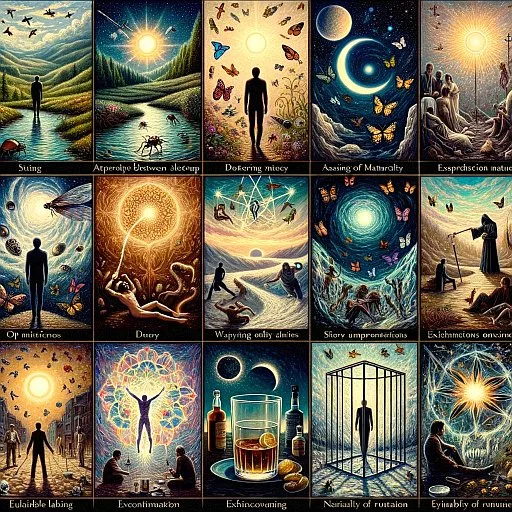I would like to walk along the course of a stream, and I would like to have insects swirling around me.
I would like to sleep until a moment before death, then wake up, still be sleepy, and let go without fear.
I wish I were not and observe the here-and-now me trapped in a crystal cage.
I would like the night and then the day again. And then, who knows? Silence, emptiness, the futile motion of the stars, the gods, whiskey, boredom, and finally, relentless as an executioner, custom.
I would like nature to laugh at her happiness.
I would like dreams only to snatch them from the arms of the night and let them wither under the desert sun.
I would like to think right and then think wrong. I hate myself in the first case and please myself in the second. Men are not perfect beings.
Drowned in metaphysics, the latter yearns for God. Squeezed in a circle, dancing, the first ones hold each other up, knowing full well that mortgages are paid only on this earth.
I would like emptiness, the emptiness that hypnotizes and enslaves the gods.
I would like, finally, to want no more.
Philosophical considerations on the concept of emptiness in Zen Buddhism
In Zen Buddhism, the concept of emptiness and vacuity has deep meaning. It goes beyond the conventional conception of emptiness as mere absence or nothingness. Emptiness, referred to as“Sunyata” in Sanskrit, is a fundamental concept that encapsulates the true nature of existence and the interconnectedness of all things.
Emptiness in Zen Buddhism involves transcending the limits of the ego and perceiving reality without the veil of subjective judgments and attachments. It is about emptying the mind of clutter and preconceived notions to allow a direct experience of reality as it is, free from the distortions of dualistic thinking.
Vacuum, known as“Ku” in Japanese, completes the concept of emptiness. It refers to the vast and boundless space beyond our conditioned perception. Embracing emptiness means cultivating a state of open-mindedness and receptivity, allowing new possibilities and insights to develop.

In Zen practice, emptiness and emptiness are not nihilistic ideas but a gateway to profound awakening and liberation. By recognizing the impermanent and interdependent nature of all phenomena, one can transcend the illusions of separate individuality and discover the inherent interconnectedness of all things.
In the realm of emptiness and vacuity, Zen practitioners often undertake meditation to directly experience this state of being. Through introspection and awareness, they strive to dissolve the illusion of a separate self and merge with the boundless emptiness that underlies all existence.
In summary, the concept of emptiness and vacuity in Zen Buddhism invites individuals to penetrate the depths of their being beyond the limits of their egoic minds. By embracing the nature of reality as fundamentally empty and interconnected, it is possible to embark on a transformational journey toward liberation and achieve a deep sense of peace.
If you like this poetic prose, you can always donate to support my activity! One coffee is enough!


